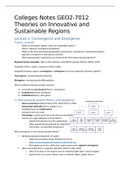Colleges Notes GEO2-7012
Theories on Innovative and
Sustainable Regions
Lecture 1: Convergence and Divergence
Topics covered
- What are innovative regions, what are sustainable regions?
- What is regional convergence/divergence?
- What do the three theoretical perspectives (neoclassical, evolutionary, institutional) predict:
regional convergence or divergence, and why?
- What regional policy implications are drawn by the three theoretical perspectives?
Regional income inequality: high on the academic and political agenda (Thomas Piketty, 2013)
Inequality within a region: example of Silicon Valley
Inequality between regions: convergence or divergence of income disparities between regions?
Convergence: moving towards uniformity
Divergence: moving towards differentiation
What do different theories predict and why?
1) Conventional neo-classical theory: convergence
2) Evolutionary theory: divergence
3) Institutional theory: divergence
1) Neo-classical growth theory (convergence)
- Homo economicus (Robert Solow 1956, Nobel Prize in 1987)
- Unbounded rationality (firms, workers, etc.)
- Complete focus on market prices
- Constant returns to scale
- Technology is public good (non-rival and non-excludable)
- Income of a region depends on three factors:
- Capital (investments and net capital flows)
- Labor (population growth and net migration)
- Technology: not specified (exogenous)
Why convergence in neo-classical growth theory?
Declining marginal productivity of capital
o Capital accumulation brings diminishing returns
o https://www.youtube.com/watch?v=ayiV7mH2_Qg
o Rich regions grow less, while poor regions grow more: regional convergence
Labor and capital flows in opposite directions (Borts & Stein 1964)
o Labor from poor to rich regions, due to relatively higher labor returns (wages)
o Capital from rich to poor regions, due to relatively higher capital returns
, o Due to mobility of people and capital, returns on capital and labor equalize regional
convergence
- Technology fully available and accessible: public good
o Diffusion of technology from rich to poor regions
o Technology contributes to regional convergence
o Technology exogenous factor: not explained
Policy implications of neoclassical growth theory:
- The free market will lower regional income inequality
- Remove all obstacles of full mobility of capital and labor
- Technology is a public good: market failure: policy intervention needed to secure incentives
for new knowledge creation through the patent system (through the granting of intellectual
monopoly rights for some time), or providing R&D subsidies
2) Evolutionary growth theory (divergence)
- Homo-Psychologicus (Herbert Simon 1957, Nobel Prize 1978)
- Bounded rationality:
- Access to limited information (despite Internet)
- Limited absorptive capacity to understand and process information
- No ‘optimizing’ but ‘satisficing’ behavior: actors try to optimize as much as they can, but
they are limited
- Actors fall back on tried and trusted heuristics: rules of thumbs
The role of knowledge in evolutionary growth theory:
- Knowledge is not a public good: it accumulates (= gather/build up) over time within
individuals and firms, through learning-by-doing
- Absorptive capacity: provides opportunities but also set limits to learning and innovation
- Creation and diffusion of knowledge is imperfect: search for new knowledge is bounded:
localized learning
- Especially diffusion of tacit knowledge (Polyani 1958, 1966): ‘we can know more than we can
tell’: hard to communicate and difficult to transfer, like how to bike:
https://www.youtube.com/watch?v=l6UBvv5uUuU
- Knowledge does not travel well between regions: geographical distance is a barrier to its
diffusion
- History matters: path dependence, due to self-reinforcing forces: increasing returns (Arthur
1994)
- Technologies: example of QWERTY keyboard: high switching costs (David 1985): lock-
in (= unwilling or unable to trade because of regulations, taxes, or penalties that
prevent it from being profitable or make it illegal to do so)
- Regions: example of Silicon Valley: increasing returns, due to agglomeration (= the
phenomenon where businesses tend to cluster close to each other and high
population areas) forces (Arthur 1989)
- Cumulative causation (= the events are interdependent to each other, effect in one event is
caused by a change in other events, it completes the cycle) (Myrdal 1957, Nobel Prize 1974):
increasing external returns to scale: agglomeration forces:
, Why divergence in evolutionary growth theory?
- Regions accumulate knowledge over time: persistent technology gaps between rich and poor
(Fagerberg and Verspagen 1996): rich become richer, poor cannot catch up: regional
divergence
- Labor and capital flows in the same direction:
- Labor migrates from poor to rich: selective migration (high-educated): brain drain in
poor regions
- Capital flows from poor to rich: high returns to capital
- Labor and capital flows lead to regional divergence
- In long-run, leapfrogging (= the ability of a developing or less developed country to
essentially "skip" less efficient and higher carbon-intensive technologies during the course of
their development) also takes place: technological breakthroughs open new opportunities
for regions
- Long-wave theory (= a long-term economic cycle in commodity prices and other prices,
believed to result from technological innovation, which produces a long period of prosperity
alternating with economic decline) (Kondratieff, Schumpeter)
Policy implications of evolutionary growth theory:
- Active policy intervention to correct the market
- Redistribution of wealth from core to periphery through tax system and public expenditures
- Focus on lagging regions
- Public investments in education
- Tax incentives for capital investments
- In line with current Cohesion policy in the EU




